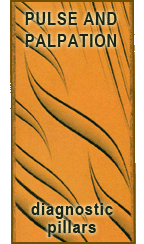Archive for the ‘Diagnosis’ Category
The Short Pulse (Duan Mai)

Short Pulse (çŸè„ˆ Duan Mai) Key point: short Indications: (Forceful) qi stagnation: qi commands blood, the vessel is not filled lengthwise.
 Last modified: July 22, 2009 ·
Last modified: July 22, 2009 ·  al ·
al ·  No Comments
No Comments
 Tags: Diagnosis, Palpation · Posted in: Pulse Class, Pulse-Palpation
Tags: Diagnosis, Palpation · Posted in: Pulse Class, Pulse-Palpation
The Moving, Stirred, Spinning Bean, Bouncing Pulse (Dong Mai)

Moving Pulse (動脈 Dong Mai, stirred, spinning bean, bouncing) Key points: Short, round, slippery and rapid, forceful in the middle position (compared to others)Indications: pain: qi and blood stagnation causes a disharmony of ascending and descending of the qi and blood.
 Last modified: July 21, 2009 ·
Last modified: July 21, 2009 ·  al ·
al ·  No Comments
No Comments
 Tags: Diagnosis, Palpation · Posted in: Pulse Class, Pulse-Palpation
Tags: Diagnosis, Palpation · Posted in: Pulse Class, Pulse-Palpation
The Slippery, Rolling Pulse (Hua Mai)

Slippery Pulse (滑脈 Hua Mai, rolling) key point: all indications point to earth phase Indications: food stagnation: any stagnation in the Earth element can lead to dampness.
 Last modified: July 20, 2009 ·
Last modified: July 20, 2009 ·  al ·
al ·  No Comments
No Comments
 Tags: Diagnosis, Palpation · Posted in: Pulse Class, Pulse-Palpation
Tags: Diagnosis, Palpation · Posted in: Pulse Class, Pulse-Palpation
The Choppy, Hesitant, Rough, or Sluggish Pulse (Se Mai)

Choppy Pulse (澀脈 Se Mai, hesitant, rough, sluggish) Key points: un-smooth, short, mutable, changes rapidly in both rate and strength. Indications: (forceful) stagnation of qi, blood, food, or phlegm: pathogens block the vessels and impair the blood circulation.
 Last modified: July 19, 2009 ·
Last modified: July 19, 2009 ·  al ·
al ·  No Comments
No Comments
 Tags: Diagnosis, Palpation · Posted in: Pulse Class, Pulse-Palpation
Tags: Diagnosis, Palpation · Posted in: Pulse Class, Pulse-Palpation
The Wiry, String-Taut, Taut, String-Like, Bowstring Pulse (Xian Mai)

Wiry Pulse (弦脈 Xian Mai, string-taut, taut, string-like, bowstring) Key points: long, taut, stable (not vibrating) Indications: Liver/GB disease: tense vascular qi due to qi stagnation being unable to move blood and the blood filling and pressing outward on the vessel.
 Last modified: July 18, 2009 ·
Last modified: July 18, 2009 ·  al ·
al ·  No Comments
No Comments
 Tags: Diagnosis, Palpation · Posted in: Pulse Class, Pulse-Palpation
Tags: Diagnosis, Palpation · Posted in: Pulse Class, Pulse-Palpation
The Tight, Tense Pulse (Jin Mai)

Tight Pulse (緊脈 Jin Mai, tense) Key points: tense, taut, forceful, vibrating (unstable, movable) Indications: Cold: cold causes constriction, vessel contracts, pulse becomes tight.
 Last modified: July 17, 2009 ·
Last modified: July 17, 2009 ·  al ·
al ·  No Comments
No Comments
 Tags: Diagnosis, Palpation · Posted in: Pulse Class, Pulse-Palpation
Tags: Diagnosis, Palpation · Posted in: Pulse Class, Pulse-Palpation
Constitutional Exceptions to Pulse Qualities

Constitutional Exceptions Now that you’ve gotten very good at differentiating all the subtle and not-so-subtle pathological findings in the pulse, you can throw all of that away. There are simply some people who have these really bizarre pulses that are just unique to them but do not indicate any pathology.
 Last modified: July 16, 2009 ·
Last modified: July 16, 2009 ·  al ·
al ·  No Comments
No Comments
 Tags: Diagnosis, Palpation · Posted in: Pulse Class, Pulse-Palpation
Tags: Diagnosis, Palpation · Posted in: Pulse Class, Pulse-Palpation
Anatomical Anomalies in Pulse Diagnosis

Anatomical Anomalies These next two pulses are more structural anomalies. Simply stated, the radial artery is not located along the Lung channel where we usually find it. Rather it can be found elsewhere. This is often the case where you have a robust individual with a ridiculously deep, thin, and weak pulse. That’s because the […]
 Last modified: July 15, 2009 ·
Last modified: July 15, 2009 ·  al ·
al ·  No Comments
No Comments
 Tags: Diagnosis, Palpation · Posted in: Pulse Class, Pulse-Palpation
Tags: Diagnosis, Palpation · Posted in: Pulse Class, Pulse-Palpation
Pulse Diagnosis Continuing Education for Acupuncturists

This concludes the Pulse Diagnosis lecture at gancao.net. If you’d like CEU credit (CA) or PDA credits (NCCAOM) please sign up to take the test at your convenience.
 Last modified: July 14, 2009 ·
Last modified: July 14, 2009 ·  al ·
al ·  No Comments
No Comments
 Tags: Diagnosis, Palpation · Posted in: Pulse Class, Pulse-Palpation
Tags: Diagnosis, Palpation · Posted in: Pulse Class, Pulse-Palpation
